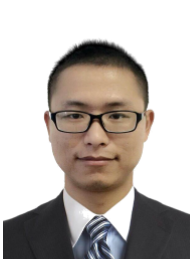


Prof. Nizhuan Wang, School of Computer Engineering, Jiangsu Ocean University, China
Title: Deep Networks & Its Applications: From Convolutional Sparse Coding to Graph Convolutional Network
BIO: Dr. Nizhuan Wang (王倪传) is a full professor of School of Computer Engineering and the Director of ARtificial Intelligence & Neuro-informatics Engineering (ARINE) Laboratory, Jiangsu Ocean University since Mar. 2018. Before that, he was an assistant professor and the deputy director (Medical Information Engineering Department) of Shenzhen University (2016.06-2018.03). He received the degrees of B.S., M.S. and Ph.D. from Heilongjiang University (in 2010), Shanghai Maritime University (in 2012 and 2016), respectively. He is a senior member of Chinese Biomedical Engineering Society, a member of Chinese Artificial Intelligence Society, a member of OHBM, the Program Committee member of 2018 IEEE ICIA and the Session Chairs of 2017 IEEE ICIA and 2018 ICIS. His master dissertation was awarded “Shanghai Outstanding Master Thesis” in 2014. He also won 2018 Finalist Winners of Young Scholar Award of the 5th Symposium of Research and Application on Neuroimage and EEG, the second prize of the 4th Lianyungang Natural Science Outstanding Academic Achievement Awardand in 2018, the Shanghai Science and Technology Progress Award in 2018, the Excellent Instructor of the National University Computer Ability Challenge Award in 2019, and Excellent Undergraduate Thesis Supervisor of Jiangsu Province Award in 2020. Recently, he was selected as the high-level talents of “Six Talent Peaks” in Jiangsu Province in Sep., 2018, Huaguoshan Mountain Talent Plan - Doctors for Innovation and Entrepreneurship (Innovation) of Lianyungang City in Dec., 2019. His main research fields include data and information mining of multi-modal neuroimaging signals, occupational neuroplasticity, brain plasticity and mental health, brain connectomics, neurosurgery and neurobotics, machine learning and artificial intelligence, etc. He has published over forty scientific papers on many journals and conferences, i.e., Hum Brain Mapp, IEEE TBME, IEEE JBHI, IEEE TNSRE, J Neurosci Methods, Magn Reson Imaging, Front Neurosci, Front Psychol, etc. He has also been the reviewer of many journals such as Neuroimage, Artificial Intelligence in Medicine, etc.


Prof. Linlin Shen, School of Computer Science, Shenzhen University, China
Title: Deep Learning based Medical Image Analysis: Data Problems and Solutions
BIO: Prof. Linlin Shen (沈琳琳) is currently the “Pengcheng Scholar” Distinguished Professor at School of Computer Science and Software Engineering, Shenzhen University, Shenzhen, China. He is also an Honorary professor at School of Computer Science, University of Nottingham, UK and Distinguished Visiting Scholar at University of Macao. He serves as the director of Computer Vision Institute, AI Research Center for Medical Image Analysis & Diagnosis and China-UK joint research lab for visual information processing. He also serves as the Co-Editor-in-Chief of the IET journal of Cognitive Computation and Systems. He received the BSc and MEng degrees from Shanghai JiaoTong University, Shanghai, China, and the Ph.D. degree from the University of Nottingham, Nottingham, U.K. He was a Research Fellow with the University of Nottingham, working on MRI brain image processing. His research interests include deep learning, facial analysis and medical image processing. Prof. Shen is listed as the Most Cited Chinese Researcher by Elsevier. He received the Most Cited Paper Award from the journal of Image and Vision Computing. His cell classification algorithms were the winners of the International Contest on Pattern Recognition Techniques for Indirect Immunofluorescence Images held by ICIP 2013 and ICPR 2016.

Prof.Anhui Liang, Shandong University of Science and Technology, China
Title: Optical Fiber Characteristics of Chinese Meridian Systems and Mussel Cell Lasers
Abstract:
中医的经络系统有科学依据吗?这是中医领域中唯一一个的被科学杂志列为125个尚未解决的难题。我将回顾经络的物质基础的不同学说。我早在1992年就在世界上首次提出了人体中的经络为光纤的理论。 我认为不论经络物质是什么,物理结构均是光纤,只是材料不同而已,我强调的是光学结构,不同段不同物质,材料是不连续的,但光路是连续的;经络在不同段可以是不同物质,可由神经、神经胶质细胞、胶原纤维、毛细血管和淋巴管组成,当它们靠近时,它们结合在一起可以形成光纤耦合器。我最近发现中华鲟鱼的筋(重要成分是胶原纤维)是光纤,可传输可见光,这是经络是可见光光纤的首个直接验证。令人吃惊的是即使中华鲟鱼的筋在沸水煮了5分钟以上仍然可以传光。以前胶原纤维已经被试验证实远红外光纤。人体可通过经络这种红外光纤传走体内(特别是内脏)产生的红外热辐射:内脏通过经络这一散热通道,将其产生的热量在穴位处散发出来;同时经络也是非常灵敏的分布式光纤传感器,可感知重要的生理和病理的变化。我认为动物体内有个复杂的散热光纤系统及光纤传感和通信系统,并且这个系统利用光和光纤运送物质(包括营养及药物),人类尚知道很少。我首先提出了生物体内天然存在的细胞激光器,也将讨论我首先提出的人体内的肌肉细胞激光器及其他细胞激光器的理论。

Prof. Yuanchang Zhong, Chongqing University, China
Title: Research and efficacy of embedded intelligent neural pacemaker
Abstract:
It has become possible to establish an artificial channel for neural action potentials, to realize the purpose of neural function recovery and reconstruction, and to get more and more attention and research.Based on the technical difficulties of high-fidelity reproduction of ultra-low-frequency neural signal, a solution based on advanced embedded intelligent chip and deep learning technology is proposed.Under the control of the intelligent chip, relying on the analog-to-digital conversion and digital-mode conversion circuit, the acquisition, digital and high-fidelity reproduction are realized.